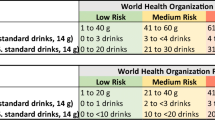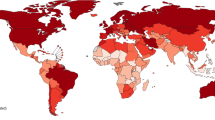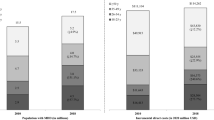Abstract
An association between problem drinking and depression among HIV-infected individuals has been previously demonstrated; however, which specific risky drinking behaviors are associated with higher levels of depression has not yet been investigated. Using an adult sample of HIV-infected primary care patients (78% male, 94% Black or Hispanic), we investigated whether depressive symptoms are associated with various risky drinking behaviors. Participants were administered the Beck Depression Inventory-II to assess depressive symptoms, and the Alcohol Use Disorders and Associated Disabilities Interview Schedule-IV to evaluate alcohol involvement. Participants with depressive symptoms (26%) were at higher risk for alcohol dependence [adjusted odds ratio (AOR) 3.8; 95% CI 2.0–7.2], regular binge drinking (AOR 2.0; 95% CI 1.1–3.8), and regular daytime drinking (AOR 2.1; 95% CI 1.2–3.8), in comparison with their non-depressed counterparts. Because both depression and unhealthy drinking negatively affect medication adherence and clinical outcomes, a better understanding of the association between depression and certain risky drinking behaviors among HIV-infected individuals is vital to improving their care and prognoses.
Similar content being viewed by others
References
Petry NM. Alcohol use in HIV patients: what we don’t know may hurt us. Int J STD AIDS. 1999;10(9):561–70.
Dew MA, Becker JT, Sanchez J, et al. Prevalence and predictors of depressive, anxiety and substance use disorders in HIV-infected and uninfected men: a longitudinal evaluation. Psychol Med. 1997;27(2):395–409.
Cook RL, Sereika SM, Hunt SC, Woodward WC, Erlen JA, Conigliaro J. Problem drinking and medication adherence among persons with HIV infection. J Gen Intern Med. 2001;16(2):83–8.
Williams JB, Rabkin JG, Remien RH, Gorman JM, Ehrhardt AA. Multidisciplinary baseline assessment of homosexual men with and without human immunodeficiency virus infection. II. Standardized clinical assessment of current and lifetime psychopathology. Arch Gen Psychiatry. 1991;48(2):124–30.
Samet JH, Phillips SJ, Horton NJ, Traphagen ET, Freedberg KA. Detecting alcohol problems in HIV-infected patients: use of the CAGE questionnaire. AIDS Res Hum Retrovir. 2004;20(2):151–5.
Galvan FH, Bing EG, Fleishman JA, et al. The prevalence of alcohol consumption and heavy drinking among people with HIV in the United States: results from the HIV cost and services utilization study. J Stud Alcohol. 2002;63(2):179–86.
Burnam MA, Bing EG, Morton SC, et al. Use of mental health and substance abuse treatment services among adults with HIV in the United States. Arch Gen Psychiatry. 2001;58(8):729–36.
Tucker JS, Burnam MA, Sherbourne CD, Kung FY, Gifford AL. Substance use and mental health correlates of nonadherence to antiretroviral medications in a sample of patients with human immunodeficiency virus infection. Am J Med. 2003;114(7):573–80.
Samet JH, Horton NJ, Meli S, Freedberg KA, Palepu A. Alcohol consumption and antiretroviral adherence among HIV-infected persons with alcohol problems. Alcohol Clin Exp Res. 2004;28(4):572–7.
Bazargan-Hejazi S, Bazargan M, Hardin E, Bing EG. Alcohol use and adherence to prescribed therapy among under-served Latino and African-American patients using emergency department services. Ethn Dis. 2005;15(2):267–75.
Walkup J, Wei W, Sambamoorthi U, Crystal S. Antidepressant treatment and adherence to combination antiretroviral therapy among patients with AIDS and diagnosed depression. Psychiatr Q. 2008;79(1):43–53.
Parsons JT, Starks TJ, Millar BM, Boonrai K, Marcotte D. Patterns of substance use among HIV-positive adults over 50: implications for treatment and medication adherence. Drug Alcohol Depend. 2014;139:33–40.
Samet JH, Cheng DM, Libman H, Nunes DP, Alperen JK, Saitz R. Alcohol consumption and HIV disease progression. J Acquir Immune Defic Syndr. 2007;46(2):194–9.
Chander G, Lau B, Moore RD. Hazardous alcohol use: a risk factor for non-adherence and lack of suppression in HIV infection. J Acquir Immune Defic Syndr. 2006;43(4):411–7.
Shuper PA, Neuman M, Kanteres F, Baliunas D, Joharchi N, Rehm J. Causal considerations on alcohol and HIV/AIDS—a systematic review. Alcohol Alcohol. 2010;45(2):159–66.
Grant BF, Stinson FS, Dawson DA, et al. Prevalence and co-occurrence of substance use disorders and independent mood and anxiety disorders: results from the national epidemiologic survey on alcohol and related conditions. Arch Gen Psychiatry. 2004;61(8):807–16.
Hasin DS, Goodwin RD, Stinson FS, Grant BF. Epidemiology of major depressive disorder: results from the national epidemiologic survey on alcoholism and related conditions. Arch Gen Psychiatry. 2005;62(10):1097–106.
Stall R, McKusick L, Wiley J, Coates TJ, Ostrow DG. Alcohol and drug use during sexual activity and compliance with safe sex guidelines for AIDS: the AIDS behavioral research project. Health Educ Q. 1986;13(4):359–71.
Theall KP, Clark RA, Powell A, Smith H, Kissinger P. Alcohol consumption, ART usage and high-risk sex among women infected with HIV. AIDS Behav. 2007;11(2):205–15.
Kessler RC, McGonagle KA, Zhao S, et al. Lifetime and 12-month prevalence of DSM-III-R psychiatric disorders in the United States. Results from the national comorbidity survey. Arch Gen Psychiatry. 1994;51(1):8–19.
Ciesla JA, Roberts JE. Meta-analysis of the relationship between HIV infection and risk for depressive disorders. Am J Psychiatry. 2001;158(5):725–30.
Komiti A, Judd F, Grech P, et al. Depression in people living with HIV/AIDS attending primary care and outpatient clinics. Aust N Z J Psychiatry. 2003;37(1):70–7.
Horberg MA, Silverberg MJ, Hurley LB, et al. Effects of depression and selective serotonin reuptake inhibitor use on adherence to highly active antiretroviral therapy and on clinical outcomes in HIV-infected patients. J Acquir Immune Defic Syndr. 2008;47(3):384–90.
Starace F, Ammassari A, Trotta MP, et al. Depression is a risk factor for suboptimal adherence to highly active antiretroviral therapy. J Acquir Immune Defic Syndr. 2002;31(Suppl 3):S136–9.
Cook JA, Cohen MH, Burke J, et al. Effects of depressive symptoms and mental health quality of life on use of highly active antiretroviral therapy among HIV-seropositive women. J Acquir Immune Defic Syndr. 2002;30(4):401–9.
Cruess DG, Petitto JM, Leserman J, et al. Depression and HIV infection: impact on immune function and disease progression. CNS Spectr. 2003;8(1):52–8.
Evans DL, Ten Have TR, Douglas SD, et al. Association of depression with viral load, CD8 T lymphocytes, and natural killer cells in women with HIV infection. Am J Psychiatry. 2002;159(10):1752–9.
Cook JA, Grey D, Burke J, et al. Depressive symptoms and AIDS-related mortality among a multisite cohort of HIV-positive women. Am J Public Health. 2004;94(7):1133–40.
Sullivan LE, Saitz R, Cheng DM, Libman H, Nunes D, Samet JH. The impact of alcohol use on depressive symptoms in human immunodeficiency virus-infected patients. Addiction. 2008;103(9):1461–7.
Bryant VE, Whitehead NE, Burrell LE 2nd, et al. Depression and apathy among people living with HIV: implications for treatment of HIV associated neurocognitive disorders. AIDS Behav. 2015;19(8):1430–7.
Esser MB, Hedden SL, Kanny D, Brewer RD, Gfroerer JC, Naimi TS. Prevalence of alcohol dependence among US adult drinkers, 2009–2011. Prev Chronic Dis. 2014;11:E206.
Stahre M, Roeber J, Kanny D, Brewer RD, Zhang X. Contribution of excessive alcohol consumption to deaths and years of potential life lost in the United States. Prev Chronic Dis. 2014;11:E109.
Wen XJ, Balluz L, Town M. Prevalence of HIV risk behaviors between binge drinkers and non-binge drinkers aged 18- to 64-years in US, 2008. J Community Health. 2012;37(1):72–9.
Durham MD, Hart R, Buchacz K, et al. Antiretroviral nonadherence and condomless sex in the HIV outpatient study, USA, 2007–2014. Int J STD AIDS. 2017;. https://doi.org/10.1177/0956462417720547.
Smart RG, Adlaf EM, Knoke D. Use of the CAGE scale in a population survey of drinking. J Stud Alcohol. 1991;52(6):593–6.
Hasin DS, Aharonovich E, O’Leary A, et al. Reducing heavy drinking in HIV primary care: a randomized trial of brief intervention, with and without technological enhancement. Addiction. 2013;108(7):1230–40.
First MB, Spitzer RL, Gibbon M, Williams JBW. Structured clinical interview for DSM-IV axis I disorders, research version, non-patient edition (SCID-I/NP). New York: Biometrics Research, New York State Psychiatric Institute; 2002.
Beck AT, Steer RA, Brown GK. Manual for the Beck Depression Inventory-II. San Antonio: Psychological Corporation; 1996.
Reitan R, Wolfson D. The Halstead–Reitan neuropsychological test battery: theory and clinical interpretation. 2nd ed. Tucson: Neuropsychology Press; 1992.
Brantley PJ, Dutton GR, Wood KB. The Beck Depression Inventory—II (BDI–II) and the Beck Depression Inventory—primary care (BDI–PC). In: Maruish ME, editor. The use of psychological testing for treatment planning and assessment outcome. 3rd ed. Mahwah: Erlbaum; 2004. p. 313–26.
Hobkirk AL, Starosta AJ, De Leo JA, et al. Psychometric validation of the BDI-II among HIV-positive CHARTER study participants. Psychol Assess. 2015;27(2):457–66.
Dozois DJA, Covin R. The Beck Depression Inventory-II, beck hopelessness scale, and beck scale for suicide ideation. In: Hersen M, Segal DL, Hilsenroth M, editors. Comprehensive handbook of psychological assessment, personality assessment, vol. 2. Hoboken: Wiley; 2004.
Wiebe JS, Penley JA. A psychometric comparison of the Beck Depression Inventory-II in English and Spanish. Psychol Assess. 2005;17(4):481–5.
Steer RA, Ball R, Ranieri WF, Beck AT. Further evidence for the construct validity of the Beck Depression Inventory-II with psychiatric outpatients. Psychol Rep. 1997;80(2):443–6.
Arbisi PA. Review of the Beck Depression Inventory-II. In: Plake BS, Impara JC, editors. The fourteenth mental measurements yearbook. Lincoln: Buros Institute of Mental Measurements; 2001.
Grothe KB, Dutton GR, Jones GN, Bodenlos J, Ancona M, Brantley PJ. Validation of the Beck Depression Inventory-II in a low-income African American sample of medical outpatients. Psychol Assess. 2005;17(1):110–4.
Penley JA, Wiebe JS, Nwosu A. Psychometric properties of the Spanish Beck Depression Inventory-II in a medical sample. Psychol Assess. 2003;15(4):569–77.
Grant BF, Dawson DA, Hasin DS. The Alcohol use disorder and associated disabilities interview schedule-DSM-IV version. Bethesda: National Institute on Alcohol Abuse and Alcoholism; 2001.
National Institute on Alcohol Abuse and Alcoholism. Drinking levels defined. https://www.niaaa.nih.gov/alcohol-health/overview-alcohol-consumption/moderate-binge-drinking.
Cottler LB, Grant BF, Blaine J, et al. Concordance of DSM-IV alcohol and drug use disorder criteria and diagnoses as measured by AUDADIS-ADR, CIDI and SCAN. Drug Alcohol Depend. 1997;47(3):195–205.
Hasin D, Carpenter KM, McCloud S, Smith M, Grant BF. The alcohol use disorder and associated disabilities interview schedule (AUDADIS): reliability of alcohol and drug modules in a clinical sample. Drug Alcohol Depend. 1997;44(2–3):133–41.
Grant BF, Harford TC, Dawson DA, Chou PS, Pickering RP. The Alcohol use disorder and associated disabilities interview schedule (AUDADIS): reliability of alcohol and drug modules in a general population sample. Drug Alcohol Depend. 1995;39(1):37–44.
Grant BF, Dawson DA, Stinson FS, Chou PS, Kay W, Pickering R. The alcohol use disorder and associated disabilities interview schedule-IV (AUDADIS-IV): reliability of alcohol consumption, tobacco use, family history of depression and psychiatric diagnostic modules in a general population sample. Drug Alcohol Depend. 2003;71(1):7–16.
Canino G, Bravo M, Ramirez R, et al. The Spanish alcohol use disorder and associated disabilities interview schedule (AUDADIS): reliability and concordance with clinical diagnoses in a Hispanic population. J Stud Alcohol. 1999;60(6):790–9.
SAS Institute Inc. SAS/STAT® software, Version 9.3. 2011.
Sullivan LE, Goulet JL, Justice AC, Fiellin DA. Alcohol consumption and depressive symptoms over time: a longitudinal study of patients with and without HIV infection. Drug Alcohol Depend. 2011;117(2–3):158–63.
Acknowledgements
We thank Derek Maloney, MD, and Erin Delker, MPH for their editorial and statistical guidance.
Funding
This work was supported by the National Institutes of Health (NIH) (Grant Nos. R01AA023163, R01AA014323, R01DA020647, K23AA023753) and the New York State Psychiatric Institute. The content is solely the responsibility of the authors and does not necessarily represent the official views of the NIH.
Author information
Authors and Affiliations
Corresponding author
Ethics declarations
Conflict of interest
The authors declare that they have no conflict of interest.
Rights and permissions
About this article
Cite this article
Algur, Y., Elliott, J.C., Aharonovich, E. et al. A Cross-Sectional Study of Depressive Symptoms and Risky Alcohol Use Behaviors Among HIV Primary Care Patients in New York City. AIDS Behav 22, 1423–1429 (2018). https://doi.org/10.1007/s10461-017-1986-0
Published:
Issue Date:
DOI: https://doi.org/10.1007/s10461-017-1986-0




